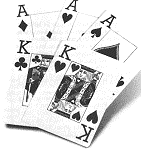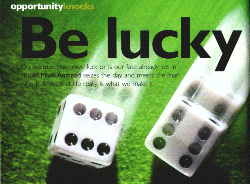JOHN, who grew up in Scotland, dreamed of winning the lottery.
"I bought a lottery ticket every week," he says. "It cost me just a small
amount of money, but that ticket gave me hope of gaining everything I ever
wanted."
Kazushige, who lives in Japan, loved horse racing. "Gambling at the racetrack
with my friends was a great deal of fun, and I sometimes won large sums of
money," he recalls.
"Bingo was my favorite game," says Linda, who
lives in Australia. "This habit cost me about $30 a week, but I loved the
thrill of winning."
John, Kazushige, and Linda viewed gambling as a relatively
harmless form of entertainment. Hundreds of millions of people around
the globe share that viewpoint. A 1999 Gallup poll showed that two thirds
of Americans approved of gambling. In 1998, American gamblers spent about
$50 billion on legalized gambling-more than they spent on movie tickets,
recorded music, spectator sports, theme parks, and video games combined.
According to a recent study, during a one-year period, more than 80 percent
of Australia's population gambled at least once, and 40 percent gambled each
week. Adults in that country, on average, spend more than $400 (U.S.) annually
on gambling, about twice the amount spent by Europeans or Americans, making
Australians among the most avid gamblers in the world.
Many Japanese are addicted to pachinko, a pinballlike game, and spend billions
a year betting on the game. In Brazil, at least $4 billion is spent each
year on gambling, much of it on lottery tickets. But Brazilians are not the
only ones who love lotteries. The magazine Public Gaming International
recently estimated that there are "306 lotteries in 102 countries." Gambling
is truly a global fascination a fascination, some say, that brings great
benefits.

Sharon Sharp, a representative of the Public Gaming Research
Institute, says that in the United States from 1964 to 1999, lottery proceeds
"account[ed] for about $125 billion of state budget dollars, with the greatest
part of this revenue coming in since 1993." Much of this money was earmarked
for public education programs, state parks, and the development of public
sports facilities. The gambling industry is also a major employer, and in
Australia alone, it employs about 100,000 people in over 7,000 businesses.
Thus, advocates of gambling argue that in addition to providing entertainment,
legalized gambling creates jobs, provides tax revenue, and improves depressed
local economies. Many people would therefore ask, 'What is wrong with gambling?'
The answer to this question, which is discussed in the following articles,
may well change your view of gambling.
Do I Have a Gambling Problem?
According to the American Psychiatric Association, the following
criteria on page 5 can guide diagnosis of pathological gambling (sometimes
called compulsive gambling). Most authorities agree that if you manifest
several of the following behaviors, you are a problem gambler, and if you
experience any one of these behaviors, you are at risk of becoming a problem
gambler.
Source: National Opinion Research center at the University
of Chicago, Gemini Research, and The Lewin Group. |
WHAT IS WRONG WITH GAMBLING?

"Around 290,000 Australians are problem gamblers and account
for over $3 billion in losses annually. This is disastrous not only for these
problem gamblers, but also for the estimated 1.5 million people they directly
affect as a result of bankruptcy, divorce, suicide and lost time at work."
-J. Howard, prime minister of Australia, 1999.
JOHN,mentioned in the preceding article, became a problem gambler.
He moved to Australia, where he got married to Linda, also a gambler. John's
addiction grew worse. He says: "I progressed from buying lottery tickets
to betting on racehorses and gambling at casinos. I ended up gambling nearly
every day. I sometimes gambled away my whole paycheck and had nothing left
with which to pay the mortgage or feed the family. Even when I won a lot
of money, I continued to gamble. It was the thrill
of winning that hooked me."
Individuals like John are not uncommon. Whole societies seem to have caught
gambling fever. The magazine USA Today said that between 1976 and
1997, there was a staggering 3,200-percent increase in the amount wagered
on legalized gambling in the United States.
"Gambling used to be considered a moral and social evil. Today it's a socially
acceptable pastime," states the Canadian newspaper The Globe and Mail.
[Let's not forget it was the Mormons who built Las Vegas - gambling
capital of the World - LB] Identifying one reason for this change in
public attitude, the paper says: "The image makeover is the direct result
of what may be the most expensive and most sustained government-funded
advertising campaign in Canadian history." What impact have efforts to promote
gambling had on some societies?
An Epidemic of Problem Gambling
According to an estimate made by the Harvard Medical School Division on Addictions, in 1996 there were "7.5 million American adult problem and pathological gamblers" and an additional "7.9 million American adolescent problem and pathological gamblers." These figures were included in a report compiled by the National Gambling Impact Study Commission (NGISC), which was presented to the U.S. Congress. The report stated that the number of people with gambling problems in America might actually be significantly higher than recorded.
Among young people, gambling is increasing at an alarming rate
Because of job loss, diminished physical health, the payment of unemployment
benefits, and the cost of treatment programs, problem gambling is estimated
to cost U.S. society billions of dollars every year. This figure, though,
does little to portray the human cost of problem gambling-the cost to families,
friends, and workmates, resulting from theft, embezzlement, suicide, domestic
violence, and child abuse. An Australian study found that
up to ten people can be directly affected by every
problem gambler. A report from the National Research Council in the United
States says that up to "50 percent of spouses and 10 percent of children
experienced physical abuse from the pathological gambler."
| The Real Message in Lottery Ads "Promoting lotteries. .. may be viewed as values education, teaching that gambling is a benign or even virtuous activity," say researchers at Duke University, in the United States, in a report submitted to the National Gambling impact Study Cornmission What effect does lottery advertising really have on the community? The report states: "It is probably not an exaggeration to say that the message of lottery advertising is a subversive one- that success lies in picking the right number. This perverse 'education' initiative being promulgated by the lottery agencies may have the ironic effect of reducing government revenues over the long run, by reducing economic growth. Specifically, if the lottery promotion erodes the propensities to work, save, and self-invest in education and training, the consequence will eventually attenuate growth in productivity. In any case, betting on a miracle is not the formula for success we usually teach to our children." |
A Contagious Addiction
Like some diseases, problem gambling can seem to spread from
parent to child. "Children of compulsive gamblers are more likely to engage
in delinquent behaviors such as smoking, drinking, and using drugs, and have
an increased risk of developing problem or pathological gambling themselves,"
states the NGISC report. The report also warns that "adolescent gamblers
are more likely than adults to develop problem and pathological gambling."
| Every Home a Casino At a fraction of the cost of building new gambling establishments, gambling organizations now build Web sites that can turn any home with an Internet-connected computer into a virtual casino. In the mid-1990's, there were approximately 25 gambling sites on the Internet. In 2001 there were more than 1,200 sites, and revenues from on-line gambling have been doubling each year. In 1997, gambling sites made $300 million on-line. In 1998 they made a further $650 million. In 2000, Internet gambling sites earned $2.2 billion, and by 2003 that figure is "expected to grow to $6.4 billion," says a Reuters news report. |
Dr. Howard J. Shaffer, director of the Harvard Medical School's
Division on Addiction Studies, says: "There is an emerging body of evidence
suggesting that illicit gambling among young people is increasing at a rate
at least proportional to the opportunity to gamble legally." As for the potential
for pathological gamblers to abuse the technology of the Internet, he says:
"As smoking crack cocaine changed the cocaine experience, I think electronics
is going to change the way gambling is experienced."
The gambling trade is often portrayed as supplying harmless
fun. But for adolescents, gambling can be as addictive as any illicit drug
and can lead to criminal behavior. A survey in the United Kingdom found that
among adolescents who gambled, "46 percent stole from their family" to support
their habit.
Despite the foregoing facts, one influential gambling association justifies
the promotion of gambling by saying: "The vast majority of Americans who
enjoy gaming experience no problem whatsoever." Even if you feel that gambling
does not adversely affect your financial or physical health, what impact
does gambling have on your spiritual health? Are there good reasons why you
should avoid gambling? The following article will consider these questions.
AVOID THE SNARE OF GAMBLING"Gambling did not affect my physical health, and I always controlled how much money I spent on gambling. But I admit that whenever I played a lottery game, I always chose what I considered to be my lucky numbers."-Linda |
 |
MANY gamblers develop a belief in lucky numbers or
lucky charms. They might not think that they take
their superstitious beliefs very seriously, but they may persist with them
nonetheless.
Some gamblers even offer prayers to God, asking that he help them win their
chosen game. Yet, the Bible contains God's condemnation of those who claim
to worship him but who are "setting in order a table for the god of Good
Luck." (Isaiah 65:11) Yes, God detests practices that promote a superstitious
belief [Belief in God IS a superstitious belief!-LB] in luck.
| Gambling and the Supernatural In a report to to National Gambling pact Study Commission, researchers at Duke University alluded to a link between the way gambling is advertised and belief in the supernatural. The report states: "Many [lottery] ads are unabashedly materialistic . . . Yet this is not the materialism of hard work and perseverance but rather of genies and magic lamps, rooted in hopes, dreams and superstition. [What do they expect when so many people believe in a none existent deity? -LB] And every lottery manager knows that many of his or her best customers base their bets on personal superstitions, astrological tables, self-styled seers, and the venerable 'dream books' that list numbers corresponding to names, dates, and dreams. Rather than emphasizing that all numbers have the same probability of being selected and that playing popular numbers will reduce a person's expected payoff in parimutuel games, lottery agencies have chosen to encourage players to choose (and stick with) personally significant numbers." |
Gambling, by its very nature, encourages a blind trust in the
so-called Lady Luck.[Religion encorages blind trust in complete nonsense
- LB]
Gambling also unashamedly promotes a love of money. In today's increasingly
secular society, money itself has become a surrogate god, and gambling a
popular way of worshiping it. The new cathedrals are the grandiose casinos,
and the new creed is that greed is good. Researchers have found that the
vast majority of people who visit casinos say they do so, not for the
entertainment or for the atmosphere, but to win "a really large amount of
money." However, the Bible warns: "The love of money is a root of all sorts
of injurious things, and by reaching out for this love some have been led
astray from the faith and have stabbed themselves all over with many pains."
-l Timothy 6:10.
At 1 Corinthians 6:9, 10, the Bible plainly states: "Do not be misled.Neither...
idolaters ... nor greedy persons ... will inherit God's kingdom." Greed is
not just a debilitating social sickness; it is a lethal spiritual sickness
-but a sickness for which there is a cure.
They Found the Strength to Change
"I tried to stop gambling many times," recalls Kazushige, mentioned
in the opening article. "I realized that my gambling with my friends at the
racetrack was destroying my family. I always lost any money that I won. I
even gambled away the money my wife had saved for our second son's birth,
and I eventually started gambling with my company's funds. As a result, I
totally lost my self-respect. My wife often wept and begged me to stop gambling,
but I just couldn't quit." Kazushige then started to study the Bible with
Jehovah's Witnesses. He says: "The more I read the Bible, the more confident
I became that there is a God and that I would benefit from listening to him.
I determined that with the power God supplies, I would quit gambling. To
my amazement, not only have I quit gambling but I have also developed
a hatred of it. Now when I think of the distress that my gambling caused
my family, my heart aches. How thankful I am to Jehovah God that he helped
me break my gambling addiction and that he is helping me lead a meaningful
life!" -Hebrews 4:12.
John, also mentioned in the opening article, likewise started studying the
Bible. He recalls: "My study of the Bible helped me reevaluate my circumstances.
For the first time, my eyes were really opened to the damage my gambling
was causing to both my family and me. I came to appreciate that gambling
promotes a selfish, greedy attitude in people,qualities that Jehovah hates.
As I continued my study, my love for Jehovah gave me the strength to break
free from gambling. I started gambling because I dreamed of finding a better
life. Now that I have given up gambling and am happily serving Jehovah, that
dream has come true."
John's wife, Linda, also decided to abstain from gambling. "It was not easy,"
she says. "But after my husband and I started studying the Bible with Jehovah's
Witnesses, I learned to focus on the more important things in life. I learned
not only to love the things God loves but also to hate the things he hates,
including Greed is not just a debilitating social sickness; it is a lethal
spiritual sickness all forms of greed. In addition to enjoying a more purposeful
life, I have more money in my purse."-Psalm 97:10.
By developing a relationship with Jehovah God, you too can find the strength
and wisdom necessary to avoid the snare of gambling. Doing so will improve
your financial, emotional, and spiritual health. You will then have the pleasure
of experiencing for yourself the truthfulness of the words recorded at Proverbs
10:22: "The blessing of Jehovah-that is what makes rich, and he adds no pain
with it."
My Comment : You can stop gambling - because it's stupid - you don't need God to help you - or to fixate on another mindless addiction to get you away from the one you have. Free your mind and the rest will follow.Note that John and Kazushige learned to hate things.I'm sure the world is better for them having hatred.

WE ALL HAVE AN EQUAL NUMBER OF CHANCE OPPORTUNITIES IT'S JUST THAT SOME
PEOPLE NOTICE THEM MORE EASILY THAN OTHERS
|

